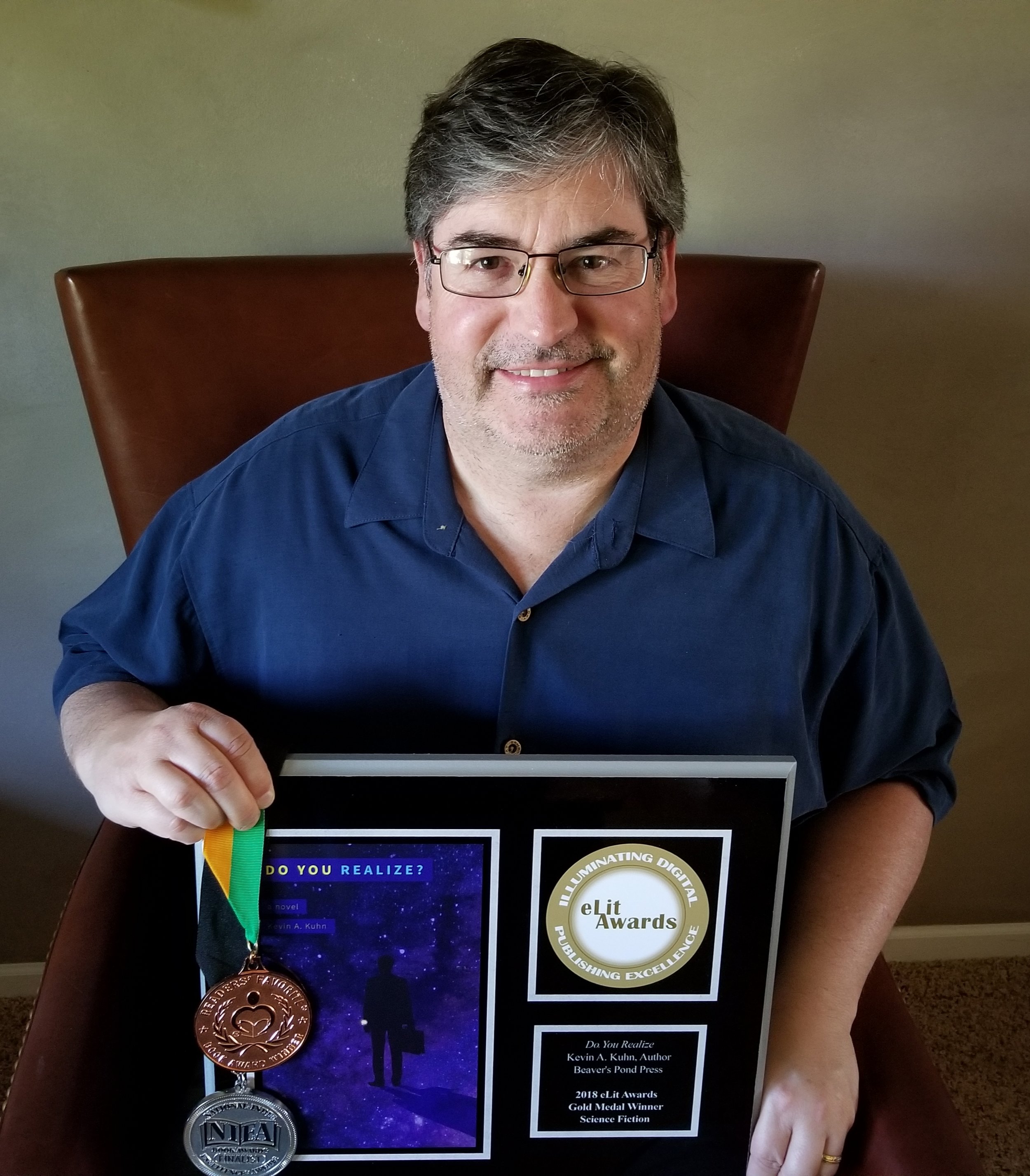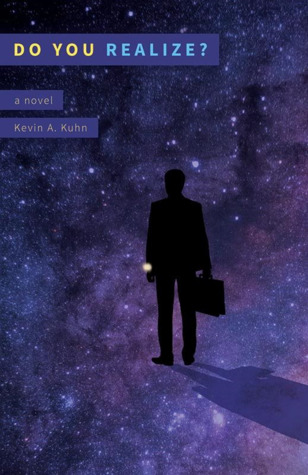Meet author Kevin A. Kuhn of 'Do You Realize?'
Kevin Kuhn lives in Eden Prairie, Minnesota, with his wife Melinda, three children, and two fierce schnoodles. He is a technology executive who enjoys sipping cheap bourbon, avoiding yard work, and living vicariously through his children's sports. While Kevin has no musical skill whatsoever, he appreciates a broad spectrum of artists from Pink Floyd to Prince and Radiohead to the Rolling Stones. His golf game is horrific with flashes of mediocrity.
‘Do You Realize?’ has won five literary awards:
2018 Gold Medal Winner - eLit Book Awards for Fantasy/Science Fiction
2018 Next Generation Indie Book Awards - Finalist for Inspirational Fiction
Readers' Favorite International Book Awards - Bronze Medal Winner - Visionary Fiction
National Indie Excellence Awards - Finalist - Visionary Fiction
IAN - Book of the Year Awards -Finalist - Science Fiction
UPDATE!
As of September 2018 Kevin Kuhn has been accepted into the Science Fiction & Fantasy Writers of America!
Q & A
What’s your writing process, do you outline the entire plot before you begin?
I started writing the first few chapters without any outline, just rough thoughts in my head about the characters and the general themes. I did not know how the book was going to end until I was about three-quarters complete. Eventually, I started outlining about three or four chapters ahead, just to stay organized and focused. I didn’t always follow my outline, as the characters would sometimes take me in a slightly different directions. If your characters are driving the plot, I think you’re on track.
What motivated you during the writing of this novel?
I was experiencing a bit of my own mid-life crises, so I started out writing the book for myself and it was cathartic. Once I entertained the thought of publishing, my rewrites were more about a fear of being boring. I believe that’s an effective approach. Write first drafts for yourself but edit and rewrite for everyone else.
Tell me about the Prologue, why start with a flash forward? Why open in a cemetery?
Well, the obvious answer is to build suspense right away, I wanted the reader to wonder who had died. We don’t get to find out until the final third of the book, so it’s a question that hopefully hangs with the reader throughout the book. However, in addition, this book started as a thought experiment. I was questioning the purpose of my life, and what better way to examine life than to picture your death or the death of a loved one.
Can you explain the Chapter Titles?
As you probably guessed every chapter title is based on a song title. Music is a common subject that runs through the novel. I listened to music while I wrote, and I found many songs to have common themes either to a chapter or to the novel overall. I also included an appendix of recommended songs at the end that have lyrics that support the novel’s themes. I probably spent way too much time finding just the right song for each chapter.
Are there parts of the novel you are particularly proud to have written?
One of the best aspects of writing, is when you hit on something that feels honest and true. A few parts come to mind, the first is Shiloh’s take on music. I won’t spoil it for future readers, but I think it’s a unique (as far I know) thought and certainly rings true to me. The second is a moment most readers probably won’t remember, when George is downtown waiting for the Metra train. He’s feeling a bit nervous on the platform and recalls when a Chicago politician committed suicide by stepping in front of an oncoming train. I wanted the reader to understand how serious George’s funk was, without him being truly suicidal (which would carry a great deal of baggage). I felt that little memory conveyed just the right level of seriousness. I also wonder if we become nervous of heights or on a train platform, because we just don’t complete trust ourselves.
Why choose this type of time travel, where George is unable to affect his own future?
I wanted this story to be more about what George could learn from the past, rather than focusing on the ripple effect of making changes. I also wanted George to have deal with his current trials, rather than erase them. I wanted to show that we tend to romanticize our own past, and I wanted to challenge what’s important in a life.
What do you find the most difficult about writing?
I think it’s to show and not tell. It’s so tempting to move the story along by having the narrator explain emotions, feelings, and motivations. If I’m writing when I’m tired, I find myself ‘telling’, and when that happens, it removes the reader from the experience. It takes a great deal more mental energy to show though actions and dialog. Thank goodness for editors and rewrites, because it’s a constant battle for me.
What’s the best thing about writing?
During the writing process, it’s finding the right path forward. So often, you realize the action or dialog doesn’t move the plot forward or it just isn’t realistic, and you must back up and think deeply about the characters and their motivation. If I get stuck for a while, and then find an honest way forward, it’s a rush. It’s like a spelunker discovering an opening to a whole new section of cave.
Are you an avid reader? If so, what genre do you enjoy most?
I love to read and enjoy different genres for the variety. My favorite, however, is science fiction, especially big, sweeping, world-building stories such as Frank Herbert's "Dune", or Asimov's Foundation series. I prefer science fiction that creates a sense of wonder and possibilities verses dark dystopian novels, but I will give nearly anything a try.
Are you planning on writing another novel?
My current work-in-progress is another speculative fiction novel. It begins with the opening of an Irish Pub in downtown Minneapolis in the late 1,800's. It follows the pub, next during the great depression and prohibition, and then to modern times. The speculative fiction aspect is that we also follow the same Irish Immigrant bar owner from the 1,800's through to modern day. It's only about twenty percent complete at this point, but I'm enjoying the research of early downtown Minneapolis. I've also been visiting a few older, downtown taverns -- strictly for research purposes! :)
Do you have any book signing events coming up in the near future?
My next is a Books and Beer event at Summit Brewing in St. Paul, Minnesota. Books and Beer is a wonderful series of events at various Twin Cities breweries celebrating local Minnesota authors. It's a really fun local event.
https://www.facebook.com/events/387433491740603/
To learn more about Kevin A. Kuhn and his works please check out his site: Big Kuhna’s Lanai.
Thank you Kevin A. Kuhn for allowing me to interview you here today.
I wish you all the best in your next endeavor!
If you are interested in my review of 'Do You Realize' click below:


